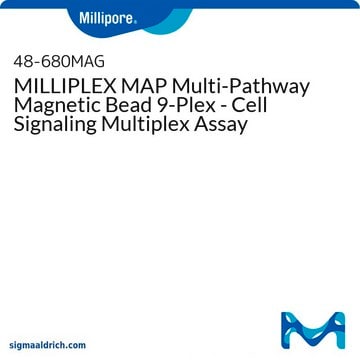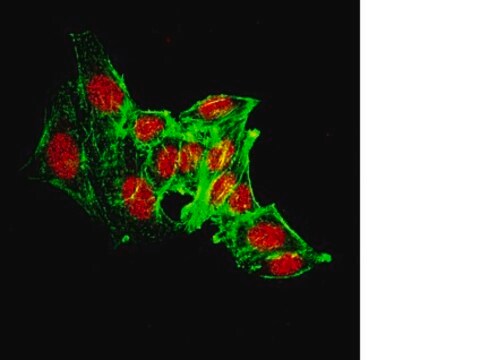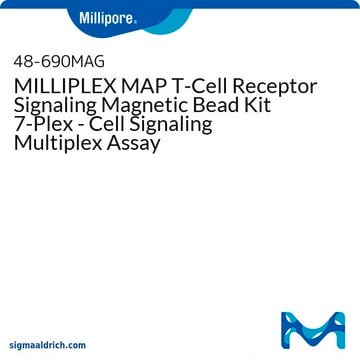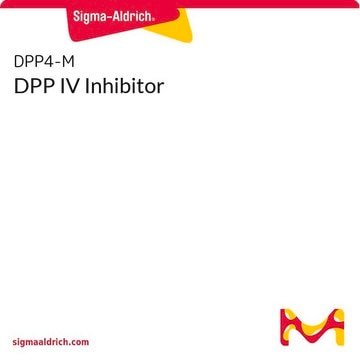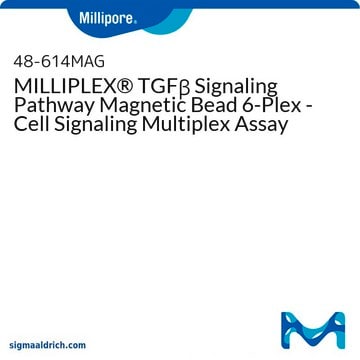General description
The serine/threonine protein kinase Akt is a key node in the PI3K pathway, one of the primary signaling cascades hyperactivated in human cancer. Akt (also called Protein kinase B or PKB) plays a central role in regulating cell survival, insulin signaling, apoptosis, protein synthesis, cell proliferation, angiogenesis, and tumor formation. Activation of Akt occurs via growth factor signaling, which results in Akt phosphorylation. Activated Akt then phosphorylates a wide range of substrates including transcription factors, kinases and other important signaling proteins. Three isoforms (Akt1, Akt2, Akt3) of Akt exist, and emerging evidence demonstrates that the three Akt isoforms may have unique, isoform-specific roles in key cellular processes. The crucial regulatory phosphorylation sites for the human Akt isoforms are Ser473 and Thr308 for Akt1, Ser474 and Thr309 for Akt2, and Ser472 and Thr305 for Akt3.The MILLIPLEX® Phospho/Total Akt2 2-plex Magnetic Bead Panel (EMD Millipore Catalog No. 48-632MAG) has been developed for the simultaneous detection of phosphorylated Akt2 (Ser473) and total Akt2 in a single well using the Luminex system. The detection assay is a rapid, convenient alternative to Western Blotting and immunoprecipitation procedures for the analysis of cell lysate samples. Each kit has sufficient reagents for one 96 well plate assay.MILLIPLEX® offers the broadest selection of analytes across a wide range of pathways. Once the panel of interest has been identified, you can rely on the quality we build into each kit to produce results you can trust. Performance criteria evaluated during the validation process include: cross-reactivity, assay CVs, kit stability, and sample behavior. In addition each kit meets stringent Quality Control criteria to ensure lot-to-lot reproducibility.It is possible to multiplex this kit together with other MILLIPLEX® Cell Signaling Phospho/Total 2-plex Magnetic Bead kits or Cell Signaling MAPmate kits. For more information please see Section C of “Preparation of Reagents for Immunoassay” in the protocol, available for download on this page.Each MILLIPLEX® MAP cell signaling and cellular metabolism panel/kit includes:Positive control cell lysates provided to qualify assay performancePremixed magnetic beads to capture analytes of interestOptimized detection antibody cocktails designed to yield consistent analyte profiles within a panel
Specificity
Cross-reactivity between the antibodies and any of the other analytes in this panel is non-detectable or negligible.
Application
Intracellular Bead-Based Multiplex Assays using the Luminex technology enables the simultaneous relative quantitation of multiple phosphorylation and total pathway proteins in tissue and cell lysate samples. An overnight (4°C) incubation is recommended for best results.This assay requires 25 μL diluted cell lysate per well.This kit must be run using Assay Buffer 2 (provided).1 - 25 μg cell lysate/well (recommended starting concentration is 40 to 1,000 μg protein/mL)Additional Cell Signaling Phospho/Total 2-plex assays or Phospho-MAPmates may be combined with this kit, up to a maximum of 9 additional 2-plex assays or single plex Cell Signaling MAPmates. The following assays should not be plexed with the Phospho/Total Akt1 2-plex Magnetic Bead Panel: Catalog # 48-618MAG, Catalog # 48-631MAG, Catalog # 48-633MAG, Catalog # 46-677MAG, Catalog # 46-675MAG, Total or panTyr MAPmates.Analytes available:Akt2 (total)Akt2 (Ser474)
Legal Information
Luminex is a registered trademark of Luminex Corp
MILLIPLEX is a registered trademark of Merck KGaA, Darmstadt, Germany
xMAP is a registered trademark of Luminex Corp
Disclaimer
Unless otherwise stated in our catalog or other company documentation accompanying the product(s), our products are intended for research use only and are not to be used for any other purpose, which includes but is not limited to, unauthorized commercial uses, in vitro diagnostic uses, ex vivo or in vivo therapeutic uses or any type of consumption or application to humans or animals.
